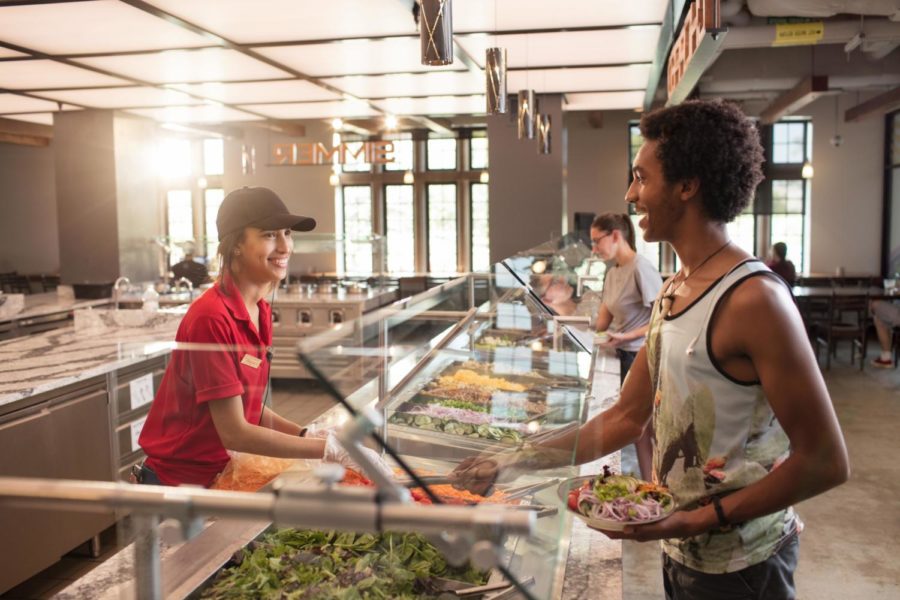Iowa State’s dining centers work to feed thousands daily while maintaining sustainable efforts
February 11, 2020
Editor’s Note: Previously this article stated called ISU Dining “Campus Dining.” The Iowa State Daily has updated this article to accurately reflect the sources referenced within. The Daily regrets this error.
ISU Dining is feeding 8,000 or more students a day at their 26 locations on campus, five of which are large dining halls. Managing to please that many students on a daily basis while fitting dietary needs as well as keeping the menu fresh is no easy task.
Mohamed Ali, director of ISU Dining, works with his team to ensure students’ needs are met in the present, near future and long term.
There are 260 full-time staff members working for ISU Dining, with roughly 1,800 students working part time throughout dining halls and other locations.
“We have a very seasoned and skilled team,” Ali said. “Some people have been here 10, 20 and 40 years, and everyone brings talent from the outside. A combination of [their talents] really help us achieve our goals every day.”
Ali brought up the changes in the atmosphere in dining halls in recent years. With anytime dining, there is more of a community environment while eating. Students are able to grab small items and talk to their friends without worry about running out of swipes.
Late night meals were recently introduced to dining halls at Iowa State and have become very popular among students.
Meal preparation for thousands of students each day must be done months ahead of time in order to stay efficient and accurate, Ali said.
“We plan all of our menus about six months prior, sometimes even a year ahead,” Ali said. “Our team has to write all the recipes and put them into the system software to make sure all of the nutrition facts are correct.”
The ordering process of food items needed for cooking is done four weeks prior to the meal being prepared and served to students.
Student feedback on menu items is important to staff members, Ali said. Dining hall team leaders will meet with students in their hall meetings to receive feedback in person and understand what is popular among majorities.
The dining halls serve different food at their locations when it comes to daily menu items to ensure they are allowing students to have options.
“The reason we [have different menus] is so students have different choices,” Ali said. “Students have their own favorite places to eat, so we try to separate them and make them different. Friley Windows usually has more vegan and vegetarian options while Seasons has smoked meats.”
Dietary needs are accommodated for, even under extreme cases for certain students at Iowa State.
“We want to feed people from everywhere,” Ali said. “Regardless of dietary requirements, whether that is religion, preference, health or any other choice they make. We have created alternate recipes and menus for vegan, vegetarian and [various religious diets.] Everyone that comes to dining should have a good meal that meets their dietary requirements.”
A cross contact policy was created in ISU Dining to make sure the separation of foods is required to prevent violation of dietary food requirements.
Individual meals can also be made for students that require extreme dietary needs. The special diet kitchen works with a dietitian to create specific, individual meals for those students.
Sustainable efforts are made through each dining location with food waste and leftovers as well as the purchasing of food items for meal preparation.
Tofu is bought through Iowa City Old Capitol Food Co., who use organic Iowa soybeans to produce tofu.
John Greving, program Coordinator for Campus Dining Services, said rotisserie chicken is purchased through Dolan Farms out of Muscatine, Iowa.
Any food leftover in catering and retail locations is taken to Food at First through the First Christian Church in Ames that is dedicated to feeding anyone hungry, no questions asked.
“Any food leftover from people’s plates goes to composting,” Ali said. “We spend tons of money to buy compostable ware for food and other items.”
The food court has compostable straws for available use to eliminate the amount of plastic being thrown away on a daily basis.
In the future, Ali said ISU Dining hopes to create an area in Union Drive Community Center where students can grab “hot meals” to go.

















